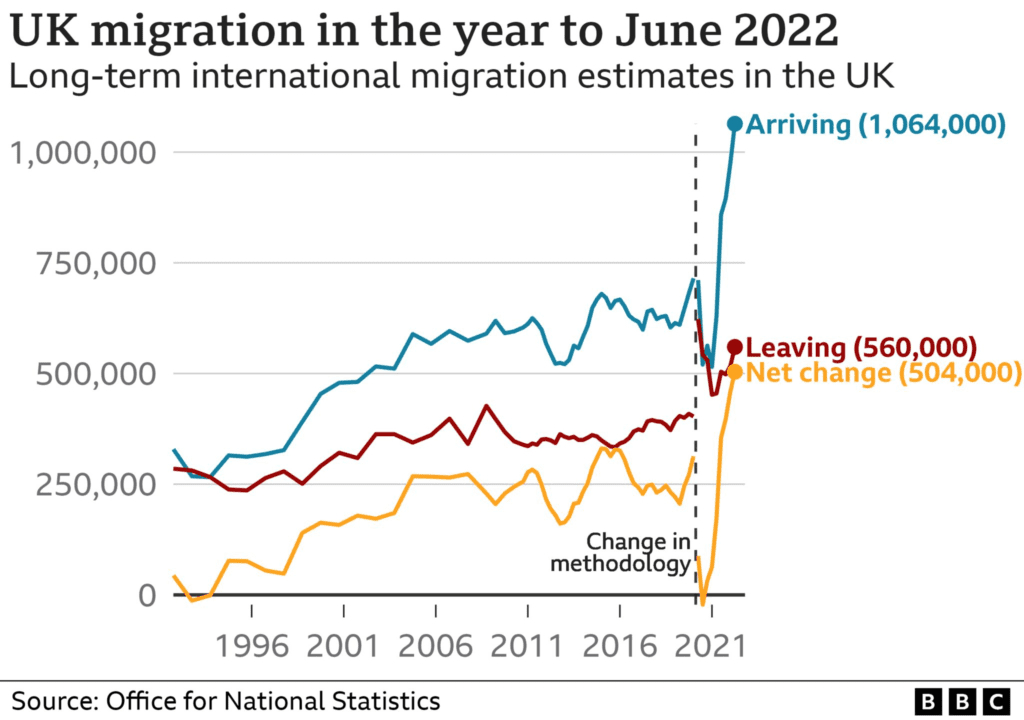“We would like to see net immigration in the tens of thousands,” then Conservative leader David Cameron told the BBC’s Andrew Marr Show back in January 2010, just months before he took office as the first Tory prime minister in 13 years.
At the time, net immigration into Britain had been hovering at around 200,000 per year, due mainly to the EU enlargement of 2004, which saw nine Eastern European nations join the bloc, coupled with the liberal immigration policies enacted under Tony Blair’s New Labour.
“I’m in favor of immigration — we’ve benefited from immigration — but I think the pressures, particularly on our public services, have been very great,” Cameron told viewers.
“I think we should be focusing on the pressure on our public services, on health and education and housing,” he added.
However, the governing Conservative party’s own 13-year reign since this pledge was first made has only seen net immigration sky-rocket more greatly than any Conservative voter could have imagined, and both Britain’s mainstream parties have systemically ignored every vote by an electorate desperate to reduce the numbers.

Despite British voters backing the Conservatives as the largest parliamentary party in four general elections since 2010, during which a vow to drastically reduce immigration was a central pledge in each manifesto, net immigration has remained firmly out of control, no more so than last year when the figure climbed to a record 504,000 more people arriving in Britain than leaving.
And let’s not forget the Brexit vote of 2016, during which the largest number of people in British history turned out to back Britain’s withdrawal from the European Union — 17,410,742 people, the overwhelming majority of whom did so on the proviso that Britain would “take back control” of its borders, the famously used slogan by the Conservative-dominated Vote Leave campaign spearheaded by Boris Johnson.
However, this vote appears to have been in vain, and with this year’s estimates placing net migration north of 700,000 — and with some analysts predicting the figure could even top 1 million — it has been made abundantly clear that the Conservatives, a party rewarded with a historic landslide majority back in 2019, simply cannot be trusted to follow through on its promises. Even worse, the party has actively disregarded its manifesto pledges and pursued its own liberal agenda.
It’s important to note that these figures don’t even include the drastic rise in illegal immigration and the ongoing asylum crisis affecting England’s southern shores, with scores of new arrivals flooding into the country on an almost daily basis in small boats from mainland Europe.
As “small c” conservative broadcaster Nigel Farage claimed this week, “the numbers are exploding” and the Conservative party is guilty of a reprehensible “breach of trust” in overseeing the highest immigration figures ever witnessed on British soil.
[pp id=77128]
“We bow to the god of GDP and we forget what this is doing to our communities, our chances of say getting a house for our children,” Farage told BBC’s Newsnight.
He’s right. The Conservative government has been obsessed with adding an extra percentage point or two to the British economy’s growth while failing to implement the necessary measures to ensure that infrastructure, such as roads, housing, schools, and hospitals, is in place to handle the population increase.
Some will argue rightfully that lawful immigrants working in Britain have a positive fiscal impact on the U.K. economy, and therefore claim it is the government that is acting negligently in failing to allocate the necessary funds to ensure public services aren’t saturated.
However, is it not also true that with an overly liberal migration policy, and by lowering wage thresholds for non-EU migrants to come and work in Britain, the government is effectively advocating unlimited immigration? And how can any administration possibly effectively allocate the funds each region needs to upgrade its infrastructure if they don’t know how many people are coming?
A counterargument to the view that Britain needs mass immigration to function is the indisputable fact that there are literally millions of working-age Brits who are not currently economically active. And instead of focusing on a mass training and recruitment drive to up-skill its own people, the government is taking the easy option of importing a new generation of workers.
By the government’s own figures, 22 percent of working-age people in England, Scotland and Wales were economically inactive in 2021. In a research paper by Bayes Business School and the International Longevity Centre (ILC) published in March this year, that figure had risen to 40 percent of all adults aged 16 or over.
The researchers urged the government to wake up to the “huge waste in human potential” that could turbo boost UK plc, and called for a “workforce strategy focusing on incentivizing workers and resolving pay issues, plus issues surrounding skills and health inequalities,” which it claimed would make all the difference.
Such a policy has been the priority of the Hungarian government under Viktor Orbán, for example, who earlier this year vowed to keep “Hungary for the Hungarians” by focusing on mobilizing economically inactive Hungarians to fill the estimated 500,000 workforce shortage. A policy to incentivize Hungarian citizens to get back to work in some capacity will add to the already existing pro-family policies promoted by the Orbán administration, including huge tax breaks for child-bearing women, the construction of more nurseries, and family housing subsidies.
[pp id=68803]
Instead, Britain’s mainstream parties for decades have opted for the easy option, to simply open the borders on an unprecedented scale without any thought for the overwhelming majority of Brits who disagree with such a policy.
And despite the growing dissent from voters, they still aren’t getting it. Just this week, Prime Minister Rishi Sunak told reporters he intended to ensure that net migration be reduced to under 500,000 a year — this was literally the record figure just last year.
And if you think that the incoming Labour government, which polls have been predicting for the last two years, will be any better, think again. On Friday, Labour party chairwoman Anneliese Dodds told Sky News “that setting a net migration target isn’t sensible,” and while a Labour government would eventually focus on “training people up in our own country,” Dodds implied that in the short term Britain under Labour could see even higher net immigration.
British voters have tolerated this for far too long; however, the issue in the U.K. is that the two-party, first-past-the-post electoral system makes it almost impossible to upend the political establishment.
A YouGov survey conducted in December last year revealed that 57 percent of Brits believe immigration into Britain is too high compared to just 7 percent who believe it is too low. Furthermore, 72 percent of respondents totally disagree with the way the government is handling immigration, and more voters than not (30 percent to 24 percent) believe mass immigration has been mostly bad for the country.
Britain is a country of welcoming people with a proud history of introducing new cultures to its shores, and while you will find very few people who claim that immigration as a principle is a bad thing, the polling results above are a damning indictment of how multiple governments have exploited the good nature of a tolerant society, and not just ignored but duped the majority who have said the rate of immigration has occurred too greatly and too quickly.
Under the current electoral system in Britain, however, you can expect the unsustainable rate of new arrivals to continue for some time yet.





